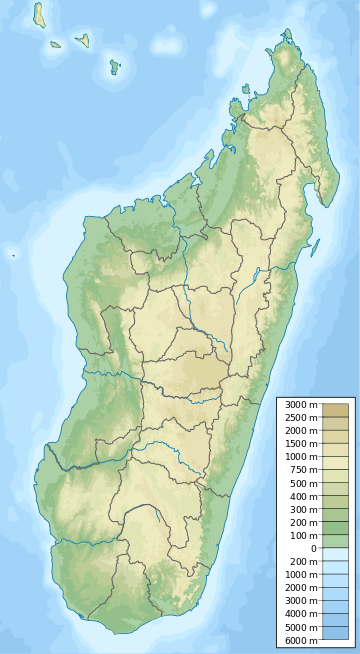Andranomena Reserve
| Andranomena Reserve | |
|---|---|
|
IUCN category IV (habitat/species management area) | |
 Location | |
| Location | Western Madagascar |
| Nearest city | Morondava |
| Coordinates | 20°10′22″S 44°31′4″E / 20.17278°S 44.51778°ECoordinates: 20°10′22″S 44°31′4″E / 20.17278°S 44.51778°E |
| Area | 64.2 km² |
| Governing body | Madagascar National Parks Association (PNM-ANGAP) |

Andranomena Special Reserve is a wildlife reserve in Menabe Region, western Madagascar, near the city of Morondava and the rural commune of Bemanonga.
Geography
This 6,400 hectares (16,000 acres) reserve is 30 kilometres (19 mi) north-east of the city of Morondava and 10 kilometres (6.2 mi) from Baoababs' Alley in western Madagascar. Altitude ranges from sea-level to 100 metres (330 ft). The annual rainfall is 900 millimetres (35 in) and can be visited throughout the year, including the wet season (December to March). There is no overnight accommodation within the park.[1][2]
Flora and fauna
Habitats on the reserve consist mainly of dry scrubland, deciduous dry forest with the vegetation dominated by the plant families, Bombacaceae, Burseraceae and Euphorbiaceae. Some of the species include Adansonia rubrostipa, commonly known as fony baobab, the ebony tree (Diospyros platycalyx), Euphorbia antso and Hazomalania voyronii which has timber that contains camphor an insect repellent. There are also small seasonal lakes with locally endemic aquatic plants.[3]
Ten species of mammal have been recorded on the reserve including seven species of lemur, 48 bird species, eleven species of reptile and one amphibian. Mammals found on the reserve include Coquerel's sifaka (Propithecus coquereli) which is evaluated as an endangered species by the International Union for Conservation of Nature (IUCN); a vulnerable species, Masoala fork-marked lemur (Phaner furcifer); red-tailed sportive lemur (Lepilemur ruficaudatus) also vulnerable; and the Fossa (Cryptoprocta ferox), a cat-like, carnivore and also a vulnerable species.[3]
Threats
The reserve is threatened by poaching, illegal felling of trees and slash-and-burn agriculture.[2]
See also
References
- ↑ "Andranomena Strict Reserve". Madagaskar.com. Retrieved 13 November 2016.
- 1 2 "Andranomena Special Reserve". Travel Madagascar. Retrieved 13 November 2016.
- 1 2 "Andranomena". Madagascar National Parc. Retrieved 13 November 2016.
